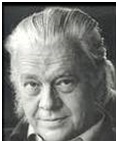|
 |
|
 |
|
|
||
Ernst Friedrich (Fritz) Schumacher (1911-77)
German-born British economist (pictured right) who worked for the National Coal Board before his world famous book, Small is Beautiful (see below) This is based upon Buddhist economics that puts people and the environment first in organizations.
Key books
Small is Beautiful (1973) (see for more detail Small is Beautiful in the Business Books section)
Summed up by its sub-title, economics as if people mattered i.e. people’s potential, creativity and spiritual growth must be maximized at work and leisure through:
Organizations must balance:
People must:
The drive for wealth and the destruction of natural resources threaten life and world peace.
Intermediate technology is:
Key quotes on work and management Man is small, and, therefore, small is beautiful. Work, properly conducted in conditions of human dignity and freedom, blesses those who do it and equally their products.
Key quote on economics Since consumption is merely a means to human well-being, the aim should be to obtain the maximum of well-being with the minimum of consumption.
Key quote on science and technology Wisdom demands a new orientation of science and technology towards the organic, the gentle, the non-violent, the elegant and beautiful.
Key quote on nature If we squander the capital represented by living nature around us, we threaten life itself.
A Guide for the Perplexed (1977)
You must seek wisdom within yourself through:
1. Meaning and purpose
2. Self-knowledge (including knowing how others see us).
3. Humility (to accept your ignorance).
4. Love and liberation (from evils like greed and envy).
5. Science This should be applied for understanding, not manipulation.
6. Religion and philosophy (that reveal the purpose of life and the understanding of truth, goodness and beauty).
Such wisdom will help you to reconcile opposites (like stability and change) that life constantly creates.
Moral problems are often divergent i.e. solutions to them conflict. For example, education must achieve both freedom and discipline.
Key quotes on success The art of living is always to make a good thing out of a bad thing. A man who fails to pursue self-knowledge is and remains a danger to society, for he will tend to misunderstand everything that other people say or do and remain blissfully unaware of many of the things he does himself.
Key quote on religion The modern experiment to live without religion has failed.
|
|
|
||
|
|
||
| Copyright © wisdomtowin.com 2025 All Rights Reserved | ||
|



